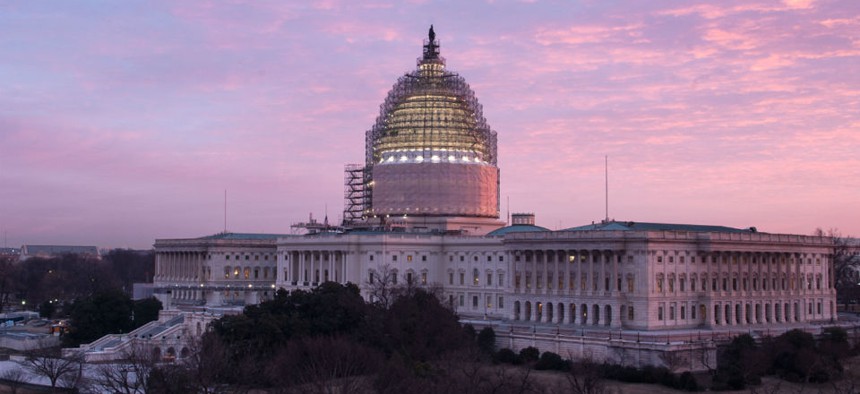
Architect of the Capitol
Congress Returns With No Plan to Avoid Shutdown
Both chambers likely will spend the week refusing to budge on DHS funding.
In these final days before the Homeland Security Department is due to shut down, two things are certain: One, the Senate will hold its fourth vote Monday to start debate on a DHS funding bill that also would scrap President Obama's executive action to defer deportations for some 4 million undocumented immigrants. Two, the outcome will be the same as it has been the last three times: Democrats will vote "no," and the impasse will remain.
Monday's roll call will reiterate what Senate Majority Leader Mitch McConnell has been saying for two weeks—the legislation is stuck in the Senate, and the chamber needs another bill from the House in order to move forward. House Republicans, for their part, seem perfectly willing to let the Senate's stalemate continue, saying that Democrats will be blamed for the shutdown that would begin at 12:01 am Saturday.
What has changed during the lawmakers' week-long recess is a potentially disruptive ruling by a Texas judge putting an injunction on the president's latest executive actions on immigration. The White House has said it will appeal, but in the meantime, all activities preparing for the broad deferral programs have been halted. (A 2012 program for unauthorized immigrants who arrived as children is still functioning.)
In Congress, the court's injunction has had the dual impact of adding fuel to Republicans' argument that Obama overstepped his bounds while also giving them a chance to back off their efforts to stop the immigration actions themselves. If the courts can stop it, the argument goes, then maybe the Hill doesn't have to.
A few cracks in the GOP façade have appeared: Last week, Sen. Marco Rubio visited Las Vegas on a book tour and said DHS should be funded regardless of what happens on Obama's immigration orders, according to the Las Vegas Review-Journal. The Florida Republican pointed out that the country can't afford to let DHS shut down, and Obama will not sign any bill that eradicates his deferred deportation programs.
By that logic, there really is no choice but to give Obama what he wants, a clean funding bill that doesn't mention his immigration actions. But nobody in the Republican party is saying that just yet.
The House is moving on to other issues as well. It is expected to vote this week on a controversial bill to rewrite the 2001 No Child Left Behind Act. The legislation marks the Republicans' opening bid in an effort to get an education bill to President Obama's desk this year. As such, the measure is conservative and highly deferential to states, removing requirements in current law that Democrats say are needed to ensure that poor schools get the same resources as affluent ones. The vote will likely be along party lines.
DEFENSE
Lawmakers will continue to digest the administration's request for military force to combat the terrorist threats in Iraq and Syria this week, with members on both sides of the aisle saying they want to support an authorization memo but aren't completely happy with the draft presented by the White House. Senate Foreign Relations Committee Chairman Bob Corker said last week that the draft represents the beginning of an important conversation. "This is something that is going to take a long commitment by all of those in the free world to undermine what ISIS is doing," he said.
Democrats, for their part, don't want the authorization to be so open-ended that it will wind up justifying military actions years down the road, as the post-Sept. 11 authorization has been used for recent conflicts. The House Armed Services Committee will hold a hearing Thursday on how the administration's proposal will help the military defeat the terrorist organizations in Iraq and Syria.






